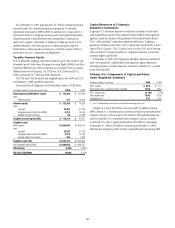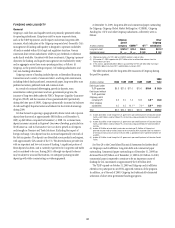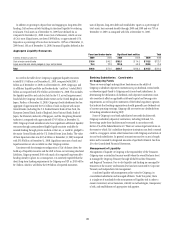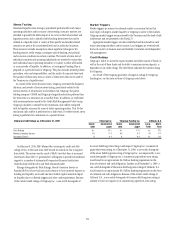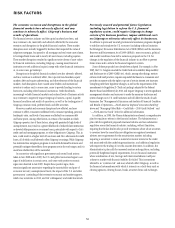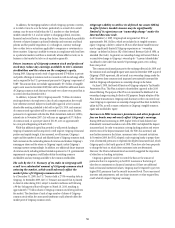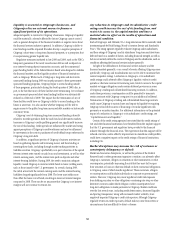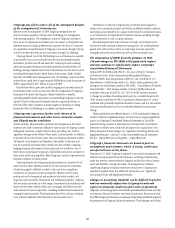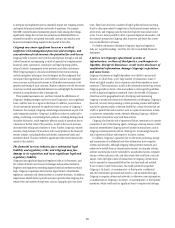Citibank 2009 Annual Report Download - page 64
Download and view the complete annual report
Please find page 64 of the 2009 Citibank annual report below. You can navigate through the pages in the report by either clicking on the pages listed below, or by using the keyword search tool below to find specific information within the annual report.54
RISK FACTORS
The economic recession and disruptions in the global
financial markets have adversely affected, and may
continue to adversely affect, Citigroup’s business and
results of operations.
The financial services industry and the capital markets have been, and
may continue to be, materially and adversely affected by the economic
recession and disruptions in the global financial markets. These market
disruptions were initially triggered by declines that impacted the value of
subprime mortgages, but spread to all mortgage and real estate asset classes,
to leveraged bank loans and to nearly all asset classes, including equities.
These market disruptions resulted in significant write-downs of asset values
by financial institutions, including Citigroup, causing many financial
institutions to seek additional capital, merge with other financial institutions
or, in some cases, go bankrupt.
Disruptions in the global financial markets have also adversely affected,
and may continue to adversely affect, the corporate bond markets, equity
markets, debt and equity underwriting, and other elements of the financial
markets. Such disruptions have caused some lenders and institutional
investors to reduce and, in some cases, cease to provide funding to certain
borrowers, including other financial institutions. Credit headwinds,
increasingly volatile financial markets and reduced levels of business activity
may continue to negatively impact Citigroup’s business, capital, liquidity,
financial condition and results of operations, as well as the trading price of
Citigroup common stock, preferred stock and debt securities.
Moreover, market and economic disruptions have affected, and may
continue to affect, consumer confidence levels, consumer spending, personal
bankruptcy rates, and levels of incurrence and default on consumer debt
and home prices, among other factors, in certain of the markets in which
Citigroup operates. Any of these factors, along with persistently high levels of
unemployment, may result in a greater likelihood of reduced client interaction
or elevated delinquencies on consumer loans, particularly with respect to Citi’s
credit card and mortgage programs, or other obligations to Citigroup. This, in
turn, could result in a higher level of loan losses and Citi’s allowances for credit
losses, all of which could adversely affect Citigroup’s earnings. While Citigroup
has instituted loss mitigation programs to work with distressed borrowers and
potentially mitigate these effects, these programs are in the early stages, and it is
uncertain whether they will be successful.
In connection with significant government and central bank actions
taken in late 2008 and in 2009, the U.S. and global economies began to see
signs of stabilization in certain areas, and some early positive economic
signs were observed in late 2009. Despite these positive signs, there
remains significant uncertainty regarding the sustainability and pace of
economic recovery, unemployment levels, the impact of the U.S. and other
governments’ unwinding of their extensive economic and market supports,
which may accelerate in 2010, and Citi’s delinquency and credit loss trends.
Previously enacted and potential future legislation,
including legislation to reform the U.S. financial
regulatory system, could require Citigroup to change
certain of its business practices, impose additional costs
on Citigroup or otherwise adversely affect its businesses.
In addition to previously enacted governmental assistance programs designed
to stabilize and stimulate the U.S. economy (including without limitation
the Emergency Economic Stabilization Act of 2008 (EESA) and the American
Recovery and Reinvestment Act of 2009 (ARRA)), recent economic, political
and market conditions have led to numerous proposals in the U.S. for
changes in the regulation of the financial industry in an effort to prevent
future crises and to reform the financial regulatory system.
Some of these proposals have already been adopted. For example, in May
2009, the U.S. Congress enacted the Credit Card Accountability Responsibility
and Disclosure Act of 2009 (CARD Act), which, among other things, restricts
certain credit card practices, requires expanded disclosures to consumers and
provides consumers with the right to opt out of certain interest rate increases.
Complying with these legislative changes, as well as the requirements of the
amendments to Regulation Z (Truth in Lending) adopted by the Federal
Reserve Board and effective July 2010, will require Citigroup to invest significant
management attention and resources to make the necessary disclosure and
system changes in its U.S. card businesses and will affect the results of such
businesses. See “Management’s Discussion and Analysis of Financial Condition
and Results of Operations—North America Regional Consumer Banking”
above and “Managing Global Risk—Credit Risk—2010 Credit Outlook” and
“—North America Cards” below for additional information.
In addition, in 2009, the Obama Administration released a comprehensive
plan for regulatory reform in the financial industry. The Administration’s
plan calls for significant proposed structural reforms and new substantive
regulation across the financial industry, including, without limitation,
requiring that broker-dealers who provide investment advice about securities
to investors have the same fiduciary obligations as registered investment
advisers; new requirements for the securitization market, including
requiring a securitizer to retain a material economic interest in the credit
risk associated with the underlying securitization; and additional regulation
with respect to the trading of over-the-counter derivatives. In addition, the
Administration’s plan calls for increased scrutiny and regulation, including
potentially heightened capital requirements, for any financial institution
whose combination of size, leverage and interconnectedness could pose
a threat to market-wide financial stability if it failed. This is sometimes
referred to as “systemic risk” and may adversely affect Citigroup, as well as
the financial intermediaries with which it interacts on a daily basis such as
clearing agencies, clearing houses, banks, securities firms and exchanges.




